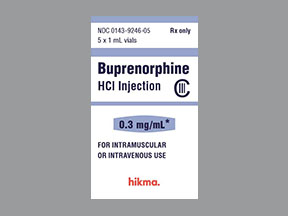
Buprenex Coupons & Savings Card – Discount Prices from $7.60
Brand for: Buprenorphine
My prescription
Edit
1ML of 0.3MG/ML, Buprenorphine (1 Syringe)
Select pharmacy

CVS
$35.80
COUPON PRICE
Walgreens
$7.60
COUPON PRICE
Albertsons
$10.78
COUPON PRICE
Walmart
$16.61
COUPON PRICEBuprenex savings card
Show this card to your pharmacist
Walgreens
$7.60
BIN
ID
PCN
GRP
011867
LH8D15ACBC
HT
LABH001
Powered by
Related opioid agonist/antagonists prescriptions
More prescriptions for pain
Related opioid agonist/antagonists prescriptions
More prescriptions for pain
Buprenex (Buprenorphine) dosage forms
Dosage Quantity Price from Per unit 1ML of 0.3MG/ML 1 Vial $10.78 $10.78 1ML of 0.3MG/ML 2 Vials $14.05 $7.03 1ML of 0.3MG/ML 3 Vials $17.33 $5.78
| Dosage | Quantity | Price from | Per unit |
|---|---|---|---|
| 1ML of 0.3MG/ML | 1 Vial | $10.78 | $10.78 |
| 1ML of 0.3MG/ML | 2 Vials | $14.05 | $7.03 |
| 1ML of 0.3MG/ML | 3 Vials | $17.33 | $5.78 |
What is the drug Buprenex used for?
Buprenex is used for the management of moderate to severe pain. It is an opioid analgesic that works by binding to specific receptors in the brain to help alleviate pain.
Is Buprenex the same as Suboxone?
Buprenex and Suboxone are not the same, although they both contain buprenorphine. Buprenex is a formulation of buprenorphine used primarily for pain management, while Suboxone contains buprenorphine and naloxone and is used for opioid dependence treatment.
What are the side effects of Buprenex?
Buprenex, which contains buprenorphine, can cause several side effects. Common side effects include nausea, vomiting, dizziness, headache, drowsiness, and constipation. Some individuals may experience sweating, dry mouth, or blurred vision. Serious side effects, though less common, can include respiratory depression, severe allergic reactions, and changes in mood or behavior. It is important for individuals to contact their healthcare provider if they experience any severe or concerning symptoms.
What is the generic name for Buprenex?
The generic name for Buprenex is buprenorphine.
What does Buprenex do to humans?
Buprenex, which contains buprenorphine, is used in humans primarily for the management of moderate to severe pain. It works by binding to opioid receptors in the brain, altering the perception and response to pain. It can also produce effects such as sedation and euphoria.
